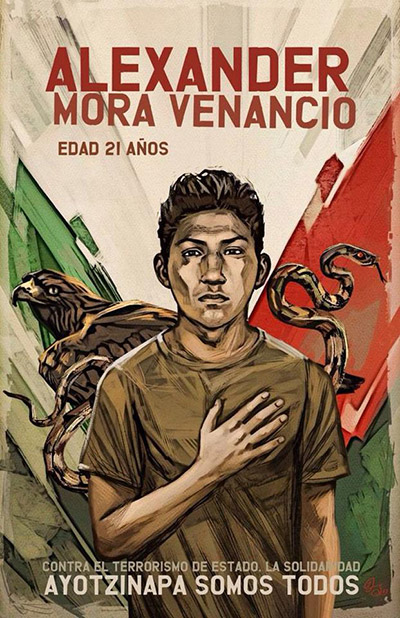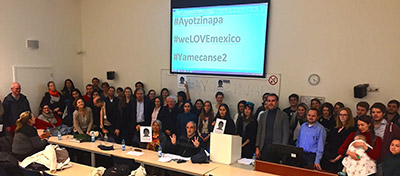Debate: ‘A Crisis on the Rise? The Impact of Violence and Impunity on Mexican Society’
Mexico is currently facing an unprecedented social and political crisis, with expanding criminal and political violence, rampant impunity and crumbling political institutions. Next to the daily report of anonymous victims of violence, last summer in Central Mexico at least 15 citizens were executed by the army in the community of Tlatlaya. In September, 43 teacher trainees disappeared in the town of Ayotzinapa in the southern state of Guerrero. In addition, illegal mass graves pop out across the country, which now count over two hundred with an undocumented number of human remains. These repulsive deeds have become the icon of the more than 150 thousand victims of violence and 25 thousand missing people in Mexico since the mid 2000s, by far the most brutal period in the contemporary history of Latin America.
The increase of violence in Mexico
The massacres in Tlatlaya and Ayotzinapa, along with the discovery of mass graves, have produced a profound impact on Mexican society and the global community. Demonstrations in and out Mexico take place almost everyday since September, to support to the victims and their families but also to demand security. Despite the implications of these events, little attention has been paid in media and governmental offices in the Netherlands.
Debate: A Crisis on the Rise?
In order to inform and reflect on the recent developments in Mexico the debate ‘A Crisis on the Rise? The Impact of Violence and Impunity on Mexican Society’ was held on 11 December at Leiden University. This activity was organised in cooperation between the Department of Latin American Studies/Institute for History (Faculty of Humanities) and Heritage of Indigenous Peoples (Faculty of Archaeology). A group of specialists, activists and diplomatic authorities analysed the current situation in Mexico, and its impact on security, human rights and the rule of law.
The participants invited to the debate were Dolf Hogewoning, Ambassador of the Netherlands to Mexico; Genner Llanes Ortiz (Centro de Investigaciones y Estudios Superiores en Antropología Social, Mexico); Nicole Sprokel (Amnesty International); Hector Olasolo Alonso (Instituto Iberoamericano de la Haya para la Paz, los Derechos Humanos y la Justicia Internacional), and Maarten Jansen (Leiden University). The debate was chaired by José Carlos G. Aguiar (Leiden University). An attentive group of above seventy people followed the debate, many of them were students and staff from Leiden University and The Hague, but there also was interested audience in general, and Mexican residents in the Netherlands. Hence, the debate had a double function, so as to inform but to also stimulate some sense of community and expose the indignation.
The two sides of Mexico
The meeting started with a brief description of the state of affairs in Mexico. The ambassador Hogewoning pointed out that there are two Mexicos, a modern and vibrant society, and a dark country, characterised by corruption and violence. Nevertheless, those two Mexicos are the two faces of the same coin. None can be understood without the other.
The disappearance and assassination of activists, young women, journalists and local leaders are unfortunately recurrent in the contemporary history of Mexico. Nicole Sprokel reminded that since 2001 Amnesty International has been reporting on the impunity and disappearances in Mexico, and pressing for urgent measures. Less than 2% of the crimes in Mexico ends with the detention of the perpetrator; the level of impunity is therefore almost absolute. Almost fifteen years later, the federal government has not been successful in addressing these issues, which have only worsened.
The cases of Tlataya and Ayotzinapa should not be described as isolated events, because they are related to (larger) processes of criminal and political violence in local communities. Yet, with the return of the Institutional Revolution Party (PRI, in Spanish) in 2012 to the federal government, there are signs of a deadly authoritarianism and repression of local activism and political leaders. Since then, more than 40 thousand citizens have been died due to violence.
In the case of Mexico, criminal or political violence cannot be observed as separate phenomena. Hector Olasolo pointed out that every form of criminal violence is political, since illegal actors (i.e. drug traffickers) do not work in a vacuum of power, to the contrary, they build linkages with local authorities who tolerate their activities or collaborate with them. In exchange, drug organisations might function as hired killers for local politicians, as seen in the case of Ayotzinapa, where the major of Iguala handed over the group of 43 students to armed actors to dispose of them.
Aurora Perez from Leiden University, read a letter to Alexander Mora Venancio in Mixteco – an Indigenous language from the South of Mexico. Alexander is one of the first students from Ayotzinapa who has been identified dead; his remains were found in a garbage dump near the place of the disappearance. In her communication, Perez condemned the brutality of a society that allows the killing of young people, and the pervasive violence and exploitation of indigenous populations in Mexico through the centuries.

Portrait of Alexander Mora Venancio, one of the students from Ayotzinapa
#WeLoveMexico
During the debate, Maarten Jansen announced that a letter was sent to the Ambassador of Mexico to the Netherlands and to the European Commission, reminding the commitment of Mexico to the protection of human rights and security for all citizens. The letter was signed by scholars specialised on Mexico working at Leiden University and other Dutch universities. It became clear that more dialogue between authorities and academics is necessary to be able to perceive the dimension of the security crisis in Mexico. The Dutch government can play an important role at the European level, to set pressure on the Mexican government but also to develop another drugs policy that does not involve an ‘open war’ and the militarisation of the public space.
At the end of the debate, some pictures of the group were made with the hashtags #Ayotzinapa #YaMeCanse2 #WeLoveMexico, as a sign of support for the victims of violence and the Mexican people in general. The images were placed on twitter and Facebook, and retweeted and favourited dozens of times.

The relevance of dialogue
This was the first debate on the security crisis in Mexico held at an academic institution in the Netherlands. The specialists highlighted the relevance of a continuous dialogue with Dutch diplomatic authorities and government, which is much needed for the Mexican case, but also because of the implications of the criss in Mexico for the Latin American region.
If you are interested in following the debates and activities at Leiden University regarding the situation in Mexico, send an e-mail to: mexicoleiden@icloud.com.
